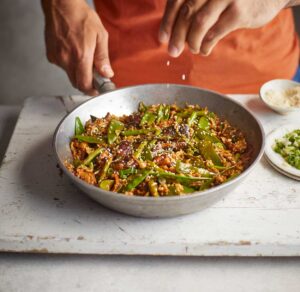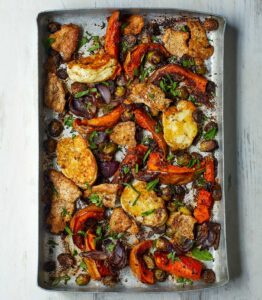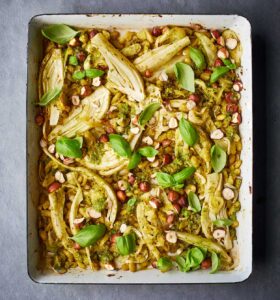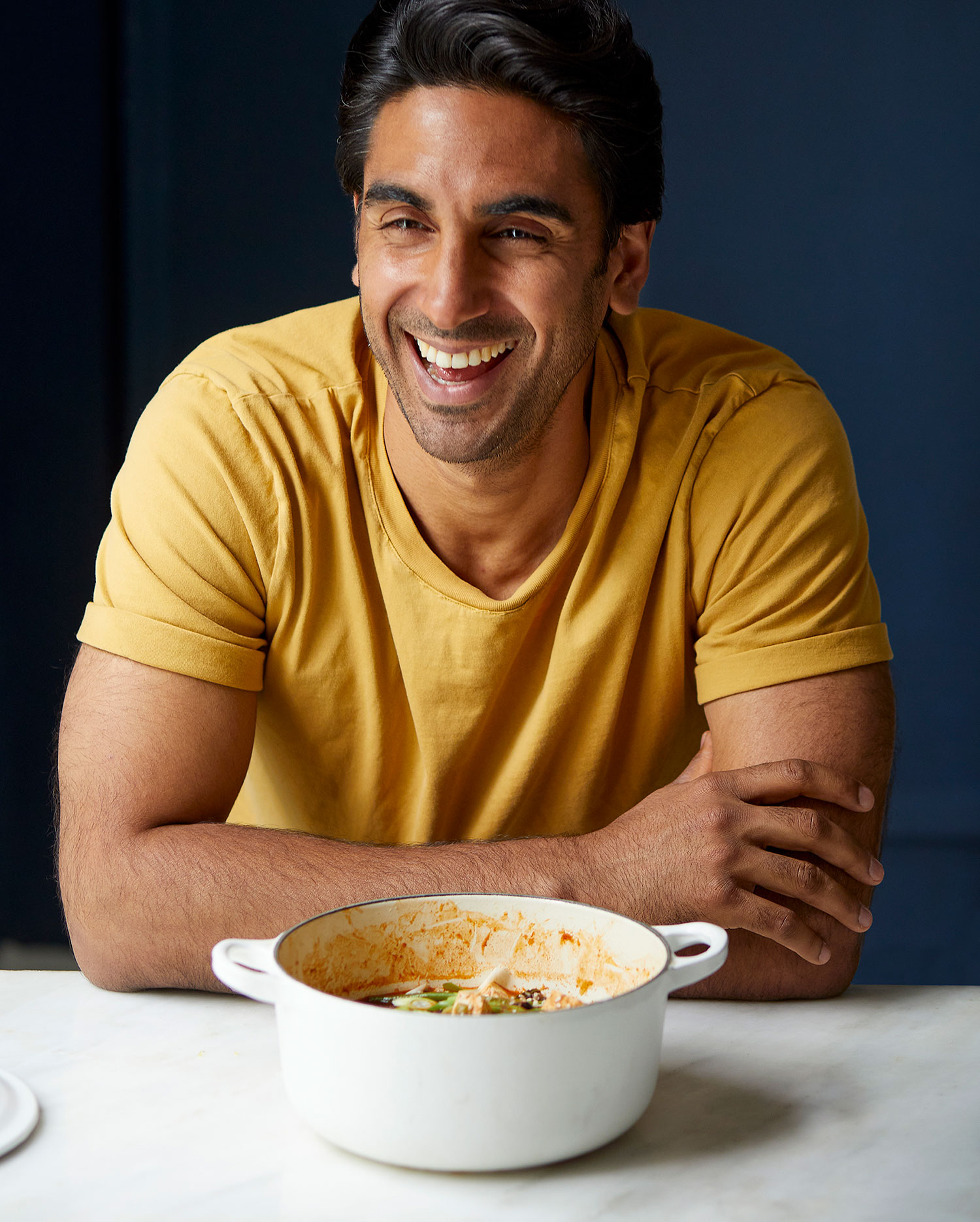A charismatic doctor with a passion for busting nutrition myths and cooking up a storm in the kitchen, Rupy Aujla is probably the best advert for his own philosophy of healthy eating. Brimming with energy, he not only juggles life as a working NHS doctor (he’s specialised in general practice and also does emergency medicine), he’s a best-selling author of three cookbooks, he runs his own non-profit – Culinary Medicine UK – with the aim of helping health practitioners learn the foundations of clinical nutrition and cooking, he’s developing a new app, and somehow still manages to find time to record his podcast, actively engage with thousands of followers across his social media channels… and he’s just completing his Masters in Nutritional Medicine.
So, if we want inspiration for finding time to cook healthy, nutritious meals when we have a busy lifestyle, there’s probably no one better placed to advise us. ‘Like most people, I don’t do fancy cooking after a long day at work, I just pop things in one pan and make sure there’s plenty of colour, good quality fats and plenty of fibre,’ Rupy says. ‘It made me think – why don’t I just teach other people how to do that too?’
3-2-1 thinking
His latest book, Doctor’s Kitchen 3-2-1 is based on the concept of recipes that all have at least three portions of fruit and veg, serve two people and are all cooked in one pan. He says he wanted to go in different direction to his previous books, The Doctor’s Kitchen and The Doctor’s Kitchen: Eat to beat illness, which were a mixture of healthy recipes along with insights into nutrition, exploring fascinating facts about the role of nutrition in helping prevent diseases such as Alzheimer’s and cancer.
‘In my first couple of books I was just trying to convince everyone about the evidence for nutrition’s impact on heart health, skin, the brain, immune support, all the health issues we don’t traditionally think of when it comes to eating well for our health,’ he explains. ‘I continue to have these conversations on my podcast and on my YouTube channel, but this book is more of an opportunity to take people on a culinary journey, focusing on the day-to-day reality of putting all this knowledge into action in the kitchen. It can be a bit overwhelming to read all this evidence and the medical jargon when all you want to do is get a decent meal on the table’.
We’ve all experienced information overload when it comes to nutrition and how to eat well. We read a magazine article extolling the benefits of kale, and then we hear something on the radio talking about how blackberries are the latest ‘superfood’ and then you’ve got the trainer at the gym telling you to eat more protein and your friend telling you she’s dropped a dress size on the 5:2 diet. It can be so difficult to unravel fact from fiction, and can leave you feeling bewildered in the supermarket aisles.
All plants are superfoods
But Rupy says the best thing you can do for your health is to eat more plants. ‘Simply increasing fruit and vegetable consumption across the board is the single most important thing for people to do,’ he Rupy. ‘Most people are struggling to hit three a day, the guidelines say five, but in reality it should be 10 plus. If you break it down into three meals plus a snack – that’s 3-2-1.
‘The message I’m trying to get across in this book is that it’s not about focusing on particular vegetables or ‘superfoods’, what’s important is the cumulative effect of all these healthy ingredients that you consume over weeks, months and years that have protective value when it comes to health conditions, and this is borne out by the science,’ says Rupy. ‘I think the key message of 3-2-1 is about going for colour and variety. So in previous books I mention individual studies looking at the benefits of cinnamon or turmeric or blackcurrants, for example, and they are fascinating and I personally love reading and talking about these discoveries, but for this book, I see it as a repositioning of The Doctor’s Kitchen and making it easy to eat well naturally, without worrying about how much you’re getting of individual ingredients, which can get really complicated.’
Rupy says the 3-2-1 concept was inspired by feedback from readers and followers on social media, going to shows, talking to colleagues and realising he needed to create a simple formula for people to follow. ‘People told me that they are interested in the information but they don’t always know how to put it into practise and there are other constraints of time, cost and motivation to consider. So 3-2-1 was created to tackle all those pain points that people have when it comes to maintaining that healthy lifestyle on a daily basis.’
‘It’s not about focusing on particular vegetables or ‘superfoods’, what’s important is the cumulative effect of all these healthy ingredients that you consume over weeks, months and years that have protective value when it comes to health conditions, and this is borne out by the science.’
Eating well on a budget
Making healthy food affordable and accessible is a cornerstone of Rupy’s work too. ‘People often think that eating more fresh fruit and vegetables is going to be more expensive – and it can be depending on the type of produce you buy. But I’ve just done a BBC TV series called Thrifty Cooking in the Doctor’s Kitchen (now available on iPlayer) and we managed to get the average portion costs across all the recipes on the series down to 89p, which I thought was really good. We made lots of really experimental dishes and food from different cultural heritages, just to show it can be done. I want to get away from the idea that eating fruit and veg is only for people with more money.’
But spreading the message that healthy food can be affordable to the people who need it most is the biggest challenge. ‘I’m really interested in poverty and childhood hunger and it’s something we focus on with the Culinary Medicine non-profit I started a few years ago,’ he says. ‘One of the core modules is food insecurity so our doctors are trained to talk to patients confidently about food banks and how to use typical food bank items to create nutritious meals, using basics like lentils and beans, for example.
‘The other side is engaging with food charities themselves, so I’m doing a podcast series organisations such as FareShare and UKHarvest, who are really active when it comes to educating those who are food insecure or who just don’t know the basics of spending less on food. My hope is this message will permeate into our culture, to show how we can eat better to nourish our children’s brains. The recipes in 3-2-1 are simple and appealing and I hope will grab people’s attention.’
Inspiring the next generation
As a doctor, Rup often finds himself talking to parents about the importance of nutrition, and he admits that the message about healthy eating and the importance of eating more fresh fruit and vegetables needs to start from childhood. Rupy is a charismatic presenter and chef, whether it’s for his podcast, TV or a cook-along on his social channels – and I can’t help thinking that a book and TV show aimed at younger cooks could be a winner. ‘I’d love to do a family cookbook, I do keep getting asked by friends and colleagues and I think a Doctor’s Kitchen kids’ book would be a dream really, I’ve got loads of ideas,’ he laughs. ‘But I think with kids you have to entice them with storytelling and that’s how you permeate the established cultural ideas of healthy eating for children, a world where it’s been normalised to eat sugary cereals and fast food chains like MacDonald’s can do TV and film tie-ins with kids’ meals. There’s a holistic approach needed for this. The lack of nutritional knowledge is shocking really, and I don’t mean that from a derogatory point of view, it’s not the parents’ fault; it’s the system we’ve created. Junk foods branded for children, the idea of the kids’ menu in a restaurant, I absolutely hate all that.’
Education is the key to helping future generations eat better, and through his Culinary Medicine initiative, Rupy is working hard to ensure young doctors are much more knowledgeable about nutrition and its impact on health than he and his peers when they completed their medical training. ‘When I first qualified 12 years ago, I had to go and teach myself these things,’ he admits. ‘Now I’m completing my Masters in Nutritional Medicine and focusing my work with Culinary Medicine to enable a new generation of health professionals to speak confidently about nutrition. We are working how to scale this up and we’re offering a digital course to universities this year too. Every fifth year medical student at UCL got taught a Culinary Medicine module last year, it’s the first time that anything like that has happened in Europe, which is great progress – but there’s still a lot of work ahead of us.’
Doctor’s Kitchen 3-2-1 by Dr Rupy Aujla (Thorsons, £16.99) is available now.
Main image: Andrew Burton

Head to www.thedoctorskitchen.com to sign up for Rupy’s newsletter and get free recipes.
Go to your favorite Podcast player to listen to Rupy talk nutrition with leading experts in The Doctor’s Kitchen, and follow him on Instagram @doctors_kitchen
Find out more about Rupy’s work training healthcare professionals in nutrition at www.culinarymedicineuk.org
A selection of Rupy’s Doctor’s Kitchen 3-2-1 recipes

Spring Vegetables with Miso Butter and Teriyaki Rice
Dr Rupy Aujla’s quick fried brown rice with crisp fresh veggies and miso butter adds up to deliciously satisfying bowl food. Miso, butter and mushrooms are a heavenly combination, and this dish is a super quick and easy way to put it to use.

Cinnamon and cumin roasted winter vegetables with baked halloumi
Spice-dusted squash and sprouts pair beautifully with salty halloumi and fresh mint in Dr Rupy Aujla’s easy oven bake. Cumin and cinnamon is such a powerful sweet and earthy spice combination: it transforms simple winter vegetables and this meal has a fantastic orchestra of flavours when cooked.

Fennel, leek and beans with basil pesto
Dr Rupy Aujla’s simple tray-bake using ready-made pesto is perfect for a quick and healthy midweek meal. Sometimes, a store-bought jar of pesto or other paste adds all the flavour you need to make a beautifully balanced and speedy meal. I always have jarred flavour enhancers like this to hand.

